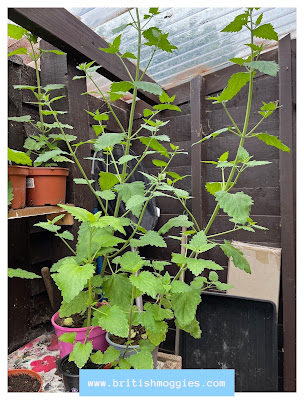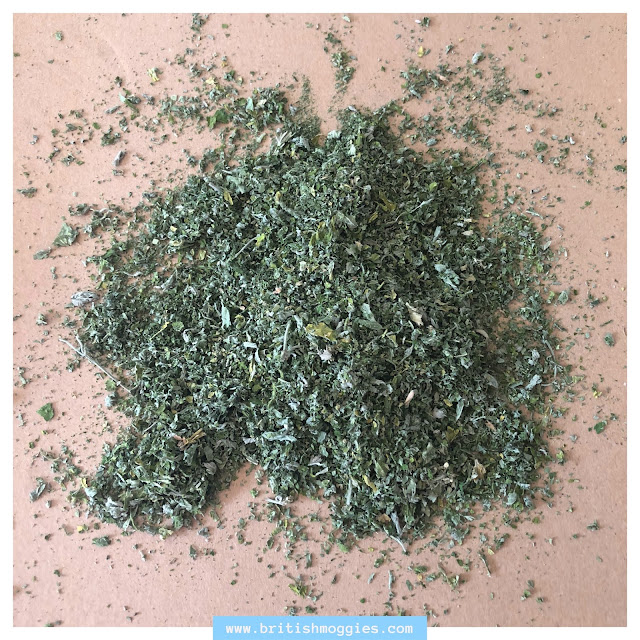The Complete Guide To Catnip
Happy Monday Pawesome Pals
Welcome to another Gardening with Cats post, and today we're going to show mew how to grow your own epically epic supply of catnip, plus share a few facts about this epic herb.
We tried two different methods of growing/germinating the seeds to see which was the fastest way to get a crop, so read our Complete Guide to Catnip and How To Grow Catnip From Seed to Harvest to Storing.
And get your best crop ever!
About Catnip
Catnip is a perennial herb, which means that it will come back year after year, and it will get bigger too. So if mew're new to gardening, we'd suggest mew get a big pot to contain it, and the same goes for garden mint too, never let that loose in your garden either, well not unless mew want it to take over.
Catnip will also self-set, this year at BBHQ one of our oldest catnip plants had self-set in the gravel in the courtyard, and we got about 15 new baby plants which we transplanted into smaller pots - see below and then into large tubs later on. In fact, that's the plant where our seed comes from; we called it the great-great-great-great grandmother catnip plant.
It is a highly fragrant herb, and if mew pull a few fresh leaves of the stem, tear them apart and give fresh to your kitties, they will love it. We do!
The bees also love it, and our plants are covered in them and butterflies too, another epic reason to grow catnip.
What Does Catnip Do To Cats
Catnip is part of the mint family and is a natural stimulant for cats, although some cats are completely immune to the effects of catnip, and Pandora is one of them. Also, catmint, valerian and silvervine have no effect on her either; she is just completely resistant to the lure of these natural kitty psychotropics.
The catnip plant produces an oil called nepetalactone which interacts with the nasal membrane, which is why when kitties snort it crazy things can happen, hence the reason why it's sometimes referred to as Kitty Crack or Kitty Coke!
So once a kitty has imbibed catnip either by snorting or eating, it activates the feline receptors in the brain by replicating certain pheromones, which makes the neurons come on like Christmas lights. In fact, scientists have likened this effect and reaction similar to that of trying LSD and marijuana. Although a catnip high will only last for about ten minutes or so before the catnip sensors are normalised again, and they're ready for round two or not.
Some cats like to rub or roll themselves in catnip or smoosh their faces in it; this helps to release more fragrance as it breaks or damages the leaves, thus giving them a bigger, more potent whiff of the heady aroma.
There can be many different reactions to catnip such as increased craziness, heightened playfulness, rolling around, eyes like dinner-plates, sneezing, becoming more vocal, scratching, jumping or zoomies etc... or other kitties may just get a chill blissed-out vibe happening and slip into a dreamy nipped-out naptopia zen zone.
There is no danger of a catnip overdose according to the information available, although if they do have too much, they may puke on the rug, sofa or wherever and may have a bit of diarrhoea, although we can safely say this has never happened at BBHQ and we like a lot of catnip! MOL
Not all catnip is equal
There are many different brands and varieties available on the market, and we've pretty much tried them all including the sprays too, and the one thing we can testify to, paw on heart is that nothing touches our homegrown stash, nothing! We have toys which the P.A. made nearly 3 years ago with our own catnip inside that are still supurr fragrant when the herb smooshed and activated. We've never had a bought-in catnip toy that's been any good for more than a few months.
We'd also suggest trying lots of different brands to see what your purrticular catnip kryptonite is, as cats have different tastes, likes and dislikes much like people, what works brilliantly for one kitty may have no reaction from another.
Though one thing we can say is, homegrown is always the best.
How to Grow Catnip
What we used:
organic compost
catnip seeds - ours are from previous plants
small pots
Optional - gloves for handling compost
To Stratify or Not To Stratify?
Stratifying the seeds:
As catnip seeds have quite a hard outer shell/husk, it's recommended to place the seeds in the freezer as this helps the seeds to germinate faster.
We read about several different methods. The first one suggested putting the seeds in a bag, freezing them overnight, taking them out and placing them in warm water to thaw and then repeating the same procedure for up to a month before planting.
Another suggested freezing for 24 hours, then soaking in hot water (not boiling) for another 24 hours and then planting.
Others we read said just soak in water for several days, and there's other info available, but we decided to do the second option of freeze for 24 hours and then soak for another 24 hours.
We also tried germination with non of the above, just to test the theory.
1. Our seed from the plant in pic 6.2. Freezing our test batch for 24 hours.3. Non-frozen seeds planted in yellow pots.4. Frozen seeds planted in blue posts planted 2 days later.5. Frozen seed 2 months later.6. This catnip plant is about 4 years old, and has sprouted from nothing to 4ft high in under 3 months.
Once planted, don't forget to water. We use a small spray bottle to just keep the soil moist. Mew can also cover with clingfilm to keep the warmth in; see our cat grass tutorial to learn more. We grew ours in the potting shed, but a sunny window sill is a great place to get seeds going.
The non-stratified seed planted in the yellow pots was very so slow to grow and didn't make healthy plants like the stratified seeds in the blue pots. The ones in the yellow pots were ok, but a bit weedy and the P.A.'s mum actually took them before we could get any pics.
So The B Team verdict is; definitely go for the stratifying method and freeze the catnip seeds before growing and then soak in water for a day or so to get the best plants.
How To Harvest and Dry Catnip
We use some sharp secateurs to cut the catnip once it's finished flowering.
We cut it approximately 12" or 30cm from the soil, so if the plant wants to sprout again, it can.
We use a natural jute string to tie the catnip into bundles, and then we hang those from hooks under our carport to dry.
We leave all the bundles here and occasionally turn them so they have plenty of air around them and they don't get damp, fusty or start to sweat.
After a couple of months or so, depending on the weather, they should look greeny/brown, and the leaves feel crispy and brittle.
1. Smooch on standby to lend a paw.2. Smooch making doubly sure it's ready for chopping and sampling a bit just for good measure.3. We put cardboard on our table and then do one bundle at a time. The P.A. wears thick rubber gardening gloves and starts to pull all the leaves off. She holds the bundle in one hand and then grasps with the other hand and pulls down sharply. If it's properly dry, it should just break up really easily and should start to look like this.If there are any larger stalks, we usually throw those away. Use your scissors or secatuers to chop into a consistency of your liking should it be required
This was Parsley; we think it was all a bit too much for him at this point! MOL
How To Store Catnip
Once it looks like the pic above, we leave it on the table in the craft room for a few days to continue to dry. We give it a swirl a couple of times a day just to move it about to get more air.
4. It gets put into glass Mason jars, obviously under the strict snoopervision of Smooch. And we let it air further.5. & 6. Your catnip is packed ready for use. Mew can also put one of those little silica bags in; mew know those little bags that always comes with a new appliance or tv or whatever, as we have found they will absorb any moisture that's left and stop the catnip losing its potency.
We also use a large Tupperware box to put any surplus in.
Getting More Catnip Seeds
Before mew throw away the cardboard which the catnip was chopped on, there should be no end of seed left behind to gather. Or if like us mew sweep the catnip up, there will be plenty in the bottom of the jars, box, Tupperware or wherever mew keep it.
Save your seed for next spring and grow some new plants just in case the ones mew have don't survive the winter.
We have also found that many of the neighbourhood cats like to come and help themselves to our catnip plants, and they can be quite brutal, so it's always best to grow more than mew need and try to keep at least one protected from nighttime pilfering and illegal cat pawties/raves in your garden.
TOP TIP
We also use this drying method for our catmint too, and we also make a couple of jars that have a catmint/catnip mix to add a bit of variety to our adventures in catnip.
Also if mew're worried about what flowers are dangerous to kitties, check out our Top Tips page. We'll be sharing our Top 12 Toxic Garden Flowers soon, but there's already a list available for indoor flowers that mew can print off to stick on your fridge, noticeboard or wherever to remind mew what not to buy.
That's us done for today, we'll be back on Wednesday with our usual Midweek News Round-Up and the winner of Melvyn's Giveaway, so do stop by to see who makes the front page this week.
Until then
Epic purrs
Basil & The B Team
Disclaimer:
We at BionicBasil HQ are not responsible or liable fur any injuries to person/s and/or cat/s, gardening addictions, compost on cats, misplaced tools and gloves, cats stealing your string, broken plants, or your project not turning out as planned. By using this information you hereby agree to indemnify and hold harmless BionicBasil and staff from and against any and all claims for personal injuries or damages of any kind arising from the use of any Gardening With Cats posts we may share.
Graphics created with paid licence www.canva.com









